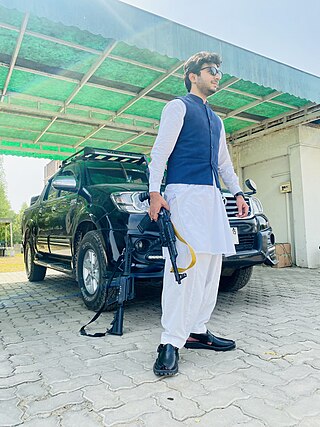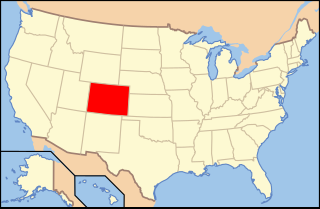Related Research Articles
Gun laws and policies, collectively referred to as firearms regulation or gun control, regulate the manufacture, sale, transfer, possession, modification, and use of small arms by civilians. Laws of some countries may afford civilians a right to keep and bear arms, and have more liberal gun laws than neighboring jurisdictions. Gun control typically restricts access to certain categories of firearms and limits the categories of persons who may be granted permission to access firearms. There may be separate licenses for hunting, sport shooting, self-defense, collecting, and concealed carry, each with different sets of requirements, privileges, and responsibilities.

Disarmament is the act of reducing, limiting, or abolishing weapons. Disarmament generally refers to a country's military or specific type of weaponry. Disarmament is often taken to mean total elimination of weapons of mass destruction, such as nuclear arms. General and Complete Disarmament was defined by the United Nations General Assembly as the elimination of all WMD, coupled with the “balanced reduction of armed forces and conventional armaments, based on the principle of undiminished security of the parties with a view to promoting or enhancing stability at a lower military level, taking into account the need of all States to protect their security.”

The right to keep and bear arms is a legal right for people to possess weapons (arms) for the preservation of life, liberty, and property. The purpose of gun rights is for self-defense, as well as hunting and sporting activities. Countries that guarantee a right to keep and bear arms include Albania, Czech Republic, Guatemala, Ukraine, Mexico, the United States, Yemen, and Switzerland.

Gun politics is defined in the United States by two primary opposing ideologies concerning the private ownership of firearms. Those who advocate for gun control support increasingly restrictive regulation of gun ownership; those who advocate for gun rights oppose increased restriction, or support the liberalization of gun ownership. These groups typically disagree on the interpretation of the text, history and tradition of the laws and judicial opinions concerning gun ownership in the United States and the meaning of the Second Amendment to the Constitution of the United States. American gun politics involves these groups' further disagreement concerning the role of firearms in public safety, the studied effects of ownership of firearms on public health and safety, and the role of guns in national and state crime.
The small arms trade is the markets of both authorized and illicit small arms and light weapons (SALW), as well as their parts, accessories, and ammunition.
Concealed carry, or carrying a concealed weapon (CCW), is the practice of carrying a weapon in public in a concealed manner, either on one's person or in close proximity. CCW is often practiced as a means of self-defense. Following the Supreme Court's NYSRPA v. Bruen (2022) decision, all states in the United States were required to allow for concealed carry of a handgun either permitlessly or with a permit, although the difficulty in obtaining a permit varies per jurisdiction.

Gun laws in Pakistan allow for the ownership of firearms in the country by the general population. Pakistan is one of the biggest open firearms markets in the world, and is in the modern era also known for its indigenous gunsmith tradition. The country is famous for producing clones of almost every notable weapon of the world. Although firearms are widely owned, heavy weaponry is permitted only in tribal areas within the province of Khyber Pakhtunkhwa. This includes the circulation of rocket-propelled grenades, short, medium, and long-range rockets, anti-aircraft guns, mortars and other types of firearms.
Firearms regulation in Mexico is governed by legislation which sets the legality by which members of the armed forces, law enforcement and private citizens may acquire, own, possess and carry firearms; covering rights and limitations to individuals—including hunting and shooting sport participants, property and personal protection personnel such as bodyguards, security officers, private security, and extending to VIPs.

On 23 October 2005, Brazil held a country-wide referendum on article 35 of the Disarmament Statute to determine whether to approve or disapprove the article, which states in full, "The sale of firearms and ammunition is prohibited in the entire national territory, except to those entities provided in article 6 of this Law." The referendum failed by nearly two-thirds, and that part of the statute was not enacted.
As of 2005 in Brazil, all firearms are required to be registered with the minimum age for gun ownership being 25. It is generally illegal to carry a gun outside a residence, and a special permit granting the right to do so may be granted to certain groups, such as law enforcement officers and judges. For citizens to legally own a gun, they must have a gun license, which costs R$88,00 and pay a fee every ten years to renew the gun register. The registration can be done online or in person with the Federal Police. Until 2008, unregistered guns could be initially registered at no cost for the gun owner, the subsequent referring fee each decade would then apply. As of the Luiz Inácio Lula da Silva administration a civilian is only allowed to own 2 firearms.

Concealed carry, or carrying a concealed weapon (CCW), is the practice of carrying a weapon, either in proximity to or on one's person or in public places in a manner that hides or conceals the weapon's presence from surrounding observers. In the United States, the opposite of concealed carry is called open carry.

Small arms and light weapons (SALW) refers in arms control protocols to two main classes of man-portable weapons.
The gun laws of New Zealand are contained in the Arms Act 1983 statute, which includes multiple amendments including those that were passed subsequent to the 1990 Aramoana massacre and the 2019 Christchurch mosque shootings.
In Germany, access to guns is controlled by the German Weapons Act, which adheres to the European Firearms Directive and was first enacted in 1972, and superseded by the law of 2003. This federal statute regulates the handling of firearms and ammunition as well as acquisition, storage, commerce and maintenance of firearms.
This is a list of laws concerning air guns by country.
Criminal possession of a weapon is the unlawful possession of a weapon by an individual. It may also be an additional crime if a violent offense was committed with a deadly weapon or firearm.

Gun laws in Colorado regulate the sale, possession, and use of firearms and ammunition in the state of Colorado in the United States.
In Honduras, the commerce, ownership, possession and use of firearms is regulated. Escalation in crime and the use of firearms in the commission of crimes and homicides has brought political and public discourse to consider regulation of arms.
Crime in Venezuela is widespread, with violent crimes such as murder and kidnapping increasing for several years. In 2014, the United Nations attributed crime to the poor political and economic environment in the country—which, at the time, had the second highest murder rate in the world. Rates of crime rapidly began to increase during the presidency of Hugo Chávez due to the institutional instability of his Bolivarian government, underfunding of police resources, and severe inequality. Chávez's government sought a cultural hegemony by promoting class conflict and social fragmentation, which in turn encouraged "criminal gangs to kill, kidnap, rob and extort". Upon Chávez's death in 2013, Venezuela was ranked the most insecure nation in the world by Gallup.
Gun law in the Philippines is regulated by the Firearms and Explosives Division of the Philippine National Police. In order to possess a firearm in the Philippines, a person must be at a minimum age of 18 years and pass a background check to be issued a Possession License. They must also take a firearms training and safety course. Any history of mental illnesses or domestic violence within the individual or the family will cause an applicant to have their request rejected.
References
- ↑ "1914 - Cronología de historia de Venezuela". Fundación Polar (in Spanish). Retrieved 2021-06-11.
- ↑ Manuel, Caballero (2007). La peste militar: escritos polémicos 1992-2007 (in Spanish). Caracas: Alfa. p. 180. ISBN 9789803542344.
- ↑ "Venezuela bans private gun ownership". 1 June 2012.
- ↑ "Gun control: Can Venezuela regulate the flow of arms?". The Christian Science Monitor . 7 August 2013.
- ↑ "Venezuelan government bans carrying firearms for 180 days". 2 May 2017. Archived from the original on 13 October 2019. Retrieved 23 December 2020.
- ↑ Venezuela's Maduro launches civilian disarmament plan
- ↑ Le Venezuela détruit plus de 15 000 armes à feu confisquées en 2018
